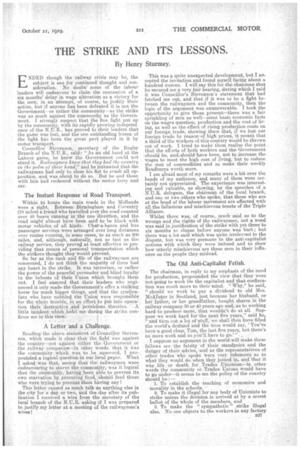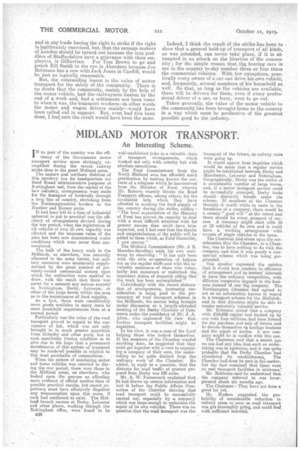THE STRIKE AND ITS LESSONS.
Page 15

Page 16

If you've noticed an error in this article please click here to report it so we can fix it.
By Henry Sturmey.
ENDED though the railway crisis may be, the subject is one for continued thought and eon-. sideration. No doubt' some of the labour leaders will endeavour to claim the concession of a six months' delay in wage alteration as a victory for the men; in an attempt, of course, to justify their action, but if anyone has been defeated it is not the Government—or rather the community—as the strike was as much against the community as the Government. I strongly suspect that the fine fight put up by the community, with its rapidly growing independ once of the N.U.R., has proved to their leaders that the game was lost, and the one outstanding lesson of the fight has been the great part played in it by motor transport.
Councillor Stevenson, secretary of the Rugby Branch of the N.U.R., said: "As an old hand at the Labour game, he knew' the Government could not stand it. Railwaymen knew that they had the country in the palm of their hand," and he intimated that the railwayman had only to close his fist to crush all opposition, and. was about to do so. But he and those with him had reckoned without the motor lorry and car.
The Instant Response of Road Transport.
Within 24 hours the main roads in the Midlands were a eight. Between Birmingham and Coventry (rs miles) a friend who traVeIled over the road counted over 40 buses running in the one direction, and the road might almost have been said to be black with motar vehicles of all kinds. Chat-a-bancs and bus passenger services were arranged over long distances (Wei routes running, in some eases, to as much as 200 miles, and, although, naturally, not so fast as the railway service, they prove4 at least effective in-providing that means of personal transportation which the strikers thought they would prevent. So far as the rank and file of the railwaymen are concerned, I do not think the majority of them had any heart in the strike. It was terrorism, or rather the power of the peaceful persuader and blind loyalty to the behests of their. Union which brought them out. I feel aksured that their leaders who engineered it only made the Government's offer a stalking horse for much bigger things, and that the syndicalists who have nobbled the Union were responsible for the whole trouble, in an effort to Put into opera=„ Lion their 'destructive and pernicious thenries. ' A little incident. which befel' me' during the strike confirms me in this view.
A Letter and a Challenge.
Reading the above staternent of Comicillor Stevenson, which 'made it clear that the fightWas against the country—not against either the Government or the railway eompaniesin other words, that it :i-ras the community which was to .be . squeezed, I pro-. pounded a logical question. in our local paper. What I asked was that, seeing that the railwaymen were endeavouring to. starve the community, was it logical that the community, having been able to prevent its own starvation by procuring food, should feed those who were trying to prevent them having any?
This letter caused as much talk as anything else in the city for' a day or two, and the day after its publication I received a wire from the secretary of the local branch of the' N.U.R. asking if I was prepared to justify my letter at a meeting of the railwaymen's wives! This was a quite unexpected development, but I accepted the invitation and found myself facing about a hundred women. I will say this for the chairman that he secured me a very fair hearing, during which I said it was Councillor's Stevenson's statement that had fetched me out, and that if it was to be a fight between the railwaymen and the community, then the logic of the argument was unanswerable. I took the opportunity to give those present—there was a fair sprinkling of men as well—sOme basic economic facts on the wages question, production and the cost of living, as well as the effect of rising production casts on our foreign trade, showing them that, if we lost our foreign trade by reason of high prices, it meant that a third of the workers of this country would be thrown out of work. I tried to make them realise the point that the efforts of both workers and the Government should be, andtshmildihave been, not to ,increase the wages to meet the high cost of living, but to reduce the cost of commodities and so make their weekly Bradburys worth more.
am afraid most of my remarks were a bit over the heads of my audience, and many of them were certainly not appreciated. The experience was interesting and valuable, as showing, -lay the speeches of a N.U.R. delegate, the chairman of the local branch, and one or two others who spoke, that those who are at the head of the labour movement are affected with all the fallacious and mischievous tenets of the Triple Whilst there was_, of course, much said as to the wrongs and the rights of the railwayraen, not a word was said in justification of the strike with yet three to six months to elapse before anyone was hurt ; but there was a lot said which. was quite irrelevant to the dispute, but was very germane to the 'antia...apitalist notions with which they were imbued and to straw how utterly mischievous are these men in their influence on the people they mislead_
The Old Anti-Capitalist Fetish.
The chairman, in reply to my emphasis of the need for production, propounded the view that they were not going to work for the capitalist and that confisca tion was much more to their mind. "Why," he said, "should we work to' pay a dividend to old Mrs.
McAlister in Scotland, just because her husband, or her father, or her gra,ndfather, bought shares in the railway company: 30 or 40 years ago and, as to working hard to produce more, that wouldn't do at all. Sup pose we work hard for the next, five years," said he, "'andtrim but fb lot of stuff,' we shall then have filled the world's dergand and the bbss would say, 'You've been a good chap, Tom, the last five years, but there's no nacre work and so you'll have to go.'" I suppose no argument in the world will make these fellows see the falsity of their standpoint 'and the danger of their advice, and as the representatives of other trades who spoke were very vehement, as to what they would do when they joined in, and that it was life'. or death for Trades Unionism—in other words the community or Trades Unions would have to go under—it seems to me the policy of the country should be 1. To establish the teaching of economies and morality in the schools. 2. To make it illegal for any body of Unionists to strike unless the decision is arrived at by a secret ballot of the whole of the members, and 3. To make the " sympathetic? strike illegal also. No one objects to the workers in any factory B37 and in any trade having the right to strike if the right is legitimately exercised, but, that the sausage makers of ,London should be turned out because the iron puddlers of Staffordshire have a grievance with their employers, is Gilbertian. For Torn Brown to go' and punch Bill Smith in the eye in Aberdeen because Joe Robinson has a row with Jack Jones in Cardiff, would be just as logically_ reasonable. But, the outstanding lesson is the value of motor transport for the safety of the community. There is no doubt that the community, mainly by the help of the motor.vehicle, had the. railwaymen beaten by the end of a.week. and, had a settlement not been come to whenit was, the transport workers—in other words the motor and wagon drivers mainly—would have been called out in support. But, even had this been done, I feel sure the result would have been the same. Indeed, I think the result of the strikehas been to show that a general hold-up of transport of all kinds, as was \intended, can never take place, if it is attempted in an attack on the liberties of the community; for the simple reason that the touring cars in use in the country to-day number three or four times the commercial vehicles. With few exceptions, praotically every owner of a car can drive his own vehicle, and, frequently, several members of his household as well. So that, so long as the vehicles are available, there will be drivers for them, • even if every professional driver of a car, or lorry, were to go out.
Taken generally, the value of the motor vehicle to the community has been brought, home to the country in a way which must he productive of the greatest possible good to the industry.
























